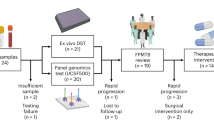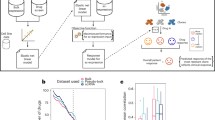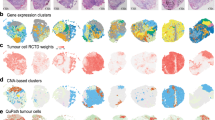Abstract
Background
The benefit of alpelisib in hormone-receptor-positive (HR+) metastatic breast cancer patients provided clinical evidence for the increasing importance of PIK3CA testing. We performed a comparison of liquid biopsy and tissue-based detection of PIK3CA mutations.
Materials and methods
PIK3CA hotspot mutation analysis using a high-resolution SiMSen-Seq assay was performed in plasma from 93/99 eligible patients with HR+/HER2− breast cancer. Additionally, mFAST-SeqS was used to estimate the tumour fractions in plasma samples. In 72/93 patients, matched tissue was available and analysed using a customised Ion Torrent panel.
Results
PIK3CA mutations were detected in 48.6% of tissue samples and 47.3% of plasma samples, with identical PIK3CA mutation detected in 24/72 (33.3%) patients both in tissue and plasma. In 10 (13.9%) patients, mutations were only found in plasma, and in 6 (8.3%) patients, PIK3CA mutations found in tissue were not detectable in ctDNA. In 49/93 plasma samples without detectable PIK3CA mutations, 22 (44.9%) samples had elevated tumour fractions, implying true negative results.
Conclusion
SiMSen-Seq-based detection of PIK3CA mutations in plasma shows advantageous concordance with the tissue analyses. A combination with an untargeted approach for detecting ctDNA fractions may confirm a negative PIK3CA result and enhance the performance of the SiMSen-Seq test.
This is a preview of subscription content, access via your institution
Access options
Subscribe to this journal
Receive 24 print issues and online access
$259.00 per year
only $10.79 per issue
Buy this article
- Purchase on Springer Link
- Instant access to full article PDF
Prices may be subject to local taxes which are calculated during checkout


Similar content being viewed by others
Data availability
Data are available at request from authors and were partially (SiMSen-Seq and mFAST-SeqS) deposited at the European Genome-phenome Archive (EGA; http://www.ebi.ac.uk/ega/) under study accession number EGAS00001004940 as following dataset: PIK3CA SiMSen-Seq data of plasma samples.
References
Torre LA, Bray F, Siegel RL, Ferlay J, Lortet-Tieulent J, Jemal A. Global cancer statistics, 2012. CA Cancer J Clin. 2015;65:87–108.
Gennari A, Conte P, Rosso R, Orlandini C, Bruzzi P. Survival of metastatic breast carcinoma patients over a 20-year period: a retrospective analysis based on individual patient data from six consecutive studies. Cancer. 2005;104:1742–50.
Ribnikar D, Volovat SR, Cardoso F. Targeting CDK4/6 pathways and beyond in breast cancer. Breast. 2019;43:8–17.
Karakas B, Bachman KE, Park BH. Mutation of the PIK3CA oncogene in human cancers. Br J Cancer. 2006;94:455–9.
Fruman DA, Chiu H, Hopkins BD, Bagrodia S, Cantley LC, Abraham RT. The PI3K pathway in human disease. Cell. 2017;170:605–35.
Koboldt DC, Fulton RS, McLellan MD, Schmidt H, Kalicki-Veizer J, McMichael JF, et al. Comprehensive molecular portraits of human breast tumours. Nature. 2012;490:61–70.
Saal LH, Holm K, Maurer M, Memeo L, Su T, Wang X, et al. PIK3CA mutations correlate with hormone receptors, node metastasis, and ERBB2, and are mutually exclusive with PTEN loss in human breast carcinoma. Cancer Res. 2005;65:2554–9.
Di Leo A, Johnston S, Lee KS, Ciruelos E, Lonning PE, Janni W, et al. Buparlisib plus fulvestrant in postmenopausal women with hormone-receptor-positive, HER2-negative, advanced breast cancer progressing on or after mTOR inhibition (BELLE-3): a randomised, double-blind, placebo-controlled, phase 3 trial. Lancet Oncol. 2018;19:87–100.
Mosele F, Stefanovska B, Lusque A, Tran Dien A, Garberis I, Droin N, et al. Outcome and molecular landscape of patients with PIK3CA-mutated metastatic breast cancer. Ann Oncol. 2020;31:377–86.
Moynahan ME, Chen D, He W, Sung P, Samoila A, You D, et al. Correlation between PIK3CA mutations in cell-free DNA and everolimus efficacy in HR(+), HER2(−) advanced breast cancer: results from BOLERO-2. Br J Cancer. 2017;116:726–30.
Andre F, Ciruelos E, Rubovszky G, Campone M, Loibl S, Rugo HS, et al. Alpelisib for PIK3CA-mutated, hormone receptor-positive advanced breast cancer. N Engl J Med. 2019;380:1929–40.
Rugo HS, Lerebours F, Ciruelos E, Drullinsky P, Ruiz-Borrego M, Neven P, et al. Alpelisib plus fulvestrant in PIK3CA-mutated, hormone receptor-positive advanced breast cancer after a CDK4/6 inhibitor (BYLieve): one cohort of a phase 2, multicentre, open-label, non-comparative study. Lancet Oncol. 2021;22:489–98.
Aftimos PG, Antunes De Melo e Oliveira AM, Hilbers F, Venet D, Vingiani A, Nili Gal Yam E, et al. First report of AURORA, the breast international group (BIG) molecular screening initiative for metastatic breast cancer (MBC) patients (pts). Ann Oncol. 2019;30:iii48.
Aftimos P, Oliveira M, Irrthum A, Fumagalli D, Sotiriou C, Nili Gal-Yam E, et al. Genomic and transcriptomic analyses of breast cancer primaries and matched metastases in AURORA, the Breast International Group (BIG) molecular screening initiative. Cancer Discov. 2021; 11:2796-2811.
Heitzer E, Ulz P, Belic J, Gutschi S, Quehenberger F, Fischereder K, et al. Tumor-associated copy number changes in the circulation of patients with prostate cancer identified through whole-genome sequencing. Genome Med. 2013;5:30.
Stahlberg A, Krzyzanowski PM, Egyud M, Filges S, Stein L, Godfrey TE. Simple multiplexed PCR-based barcoding of DNA for ultrasensitive mutation detection by next-generation sequencing. Nat Protoc. 2017;12:664–82.
Belic J, Koch M, Ulz P, Auer M, Gerhalter T, Mohan S, et al. Rapid identification of plasma DNA samples with increased ctDNA levels by a modified FAST-SeqS approach. Clin Chem. 2015;61:838–49.
Belic J, Graf R, Bauernhofer T, Cherkas Y, Ulz P, Waldispuehl-Geigl J, et al. Genomic alterations in plasma DNA from patients with metastasized prostate cancer receiving abiraterone or enzalutamide. Int J Cancer. 2018;143:1236–48.
Wang K, Li M, Hakonarson H. ANNOVAR: functional annotation of genetic variants from high-throughput sequencing data. Nucleic Acids Res. 2010;38:e164.
Cingolani P, Platts A, Wang le L, Coon M, Nguyen T, Wang L, et al. A program for annotating and predicting the effects of single nucleotide polymorphisms, SnpEff: SNPs in the genome of Drosophila melanogaster strain w1118; iso-2; iso-3. Fly (Austin). 2012;6:80–92.
Vasan N, Razavi P, Johnson JL, Shao H, Shah H, Antoine A, et al. Double PIK3CA mutations in cis increase oncogenicity and sensitivity to PI3Kalpha inhibitors. Science. 2019;366:714–23.
Suppan C, Brcic I, Tiran V, Mueller HD, Posch F, Auer M, et al. Untargeted assessment of tumor fractions in plasma for monitoring and prognostication from metastatic breast cancer patients undergoing systemic treatment. Cancers (Basel). 2019;11:1171.
Baselga J, Im SA, Iwata H, Cortes J, De Laurentiis M, Jiang Z, et al. Buparlisib plus fulvestrant versus placebo plus fulvestrant in postmenopausal, hormone receptor-positive, HER2-negative, advanced breast cancer (BELLE-2): a randomised, double-blind, placebo-controlled, phase 3 trial. Lancet Oncol. 2017;18:904–16.
Baselga J, Dent SF, Cortés J, Im Y-H, Diéras V, Harbeck N, et al. Phase III study of taselisib (GDC-0032) + fulvestrant (FULV) v FULV in patients (pts) with estrogen receptor (ER)-positive, PIK3CA-mutant (MUT), locally advanced or metastatic breast cancer (MBC): primary analysis from SANDPIPER. J Clin Oncol. 2018;36:LBA1006–LBA1006.
Baselga J, Sellami D, El-Hashimy M, Dharan B, Wang A, Scheuer N, et al. Abstract A050: PIK3CA mutation status in tumor tissue and ctDNA as a biomarker for PFS in patients with HR+, HER2- ABC treated with buparlisib or placebo plus fulvestrant: results from the BELLE-2 and BELLE-3 randomized studies. Mol Cancer Ther. 2018;17:A050–A050.
Martinez-Saez O, Chic N, Pascual T, Adamo B, Vidal M, Gonzalez-Farre B, et al. Frequency and spectrum of PIK3CA somatic mutations in breast cancer. Breast Cancer Res. 2020;22:45.
Juric D, Ciruelos E, Rubovszky G, Campone M, Loibl S, Rugo H, et al. Abstract GS3-08: Alpelisib + fulvestrant for advanced breast cancer: subgroup analyses from the phase III SOLAR-1 trial. Cancer Res. 2019;79:GS3-08-GS3.
Dandachi N, Posch F, Graf R, Suppan C, Klocker EV, Müller HD, et al. Longitudinal tumor fraction trajectories predict risk of progression in metastatic HR + breast cancer patients undergoing CDK4/6 treatment. Mol Oncol. 2020;15:2390-2400.
Li H, Davis AA, Liu X-R, Xie F, Gui X-Y, Chen Y-F, et al. Cell-free DNA comparative analysis of hormone receptor-positive, first-line metastatic breast cancer genomic landscape in the United States and China. J Clin Oncol. 2020;38:1059.
Tzanikou E, Markou A, Politaki E, Koutsopoulos A, Psyrri A, Mavroudis D, et al. PIK3CA hotspot mutations in circulating tumor cells and paired circulating tumor DNA in breast cancer: a direct comparison study. Mol Oncol. 2019;13:2515–30.
Markou A, Farkona S, Schiza C, Efstathiou T, Kounelis S, Malamos N, et al. PIK3CA mutational status in circulating tumor cells can change during disease recurrence or progression in patients with breast cancer. Clin Cancer Res. 2014;20:5823–34.
Bi L, Okabe I, Bernard DJ, Wynshaw-Boris A, Nussbaum RL. Proliferative defect and embryonic lethality in mice homozygous for a deletion in the p110alpha subunit of phosphoinositide 3-kinase. J Biol Chem. 1999;274:10963–8.
O’Leary B, Cutts RJ, Liu Y, Hrebien S, Huang X, Fenwick K, et al. The genetic landscape and clonal evolution of breast cancer resistance to palbociclib plus fulvestrant in the PALOMA-3 trial. Cancer Discov. 2018;8:1390–403.
Turner NC, Kingston B, Kilburn LS, Kernaghan S, Wardley AM, Macpherson IR, et al. Circulating tumour DNA analysis to direct therapy in advanced breast cancer (plasmaMATCH): a multicentre, multicohort, phase 2a, platform trial. Lancet Oncol. 2020;21:1296–308.
Acknowledgements
We thank Klara Balic for English proofreading. In addition, we want to acknowledge that part of this manuscript was published as a doctoral thesis.
Funding
This work was supported by the Christian Doppler Research Fund for Liquid Biopsies for Early Detection of Cancer led by EH supported by the Federal Ministry of Digital and Economic Affairs and by Novartis and Pfizer.
Author information
Authors and Affiliations
Contributions
CS, AT, ND and MB designed the study. RG and KK performed sequencing experiments, SJ and PR performed pathological evaluation, CS, EVK, AT, FP and MB contributed to patient care and data acquisition. ND and FP performed the statistical analysis, CS, AT, ND, MB, EH and PJJ performed interpretation of results. CS, ND, MB and FP drafted and revised the manuscript. ND, EH and MB supervised the study. All authors reviewed the manuscript and approved its final version.
Corresponding authors
Ethics declarations
Ethics approval and consent to participate
The study was approved by the ethics committee of the Medical University Graz (ethical approval number 21–227 ex 09/10), and written informed consent was obtained from all patients.
Competing interests
CS received travel expenses, consulting fees and honoraria from Amgen, Astra Zeneca, Eli Lilly, Novartis, Pfizer, Roche and Samsung, SJ received honoraria from Novartis and Roche, EVK has received travel expenses and honoraria from Astra Zeneca and Pierre- Fabre, RB had a consulting role, received honoraria, research funding and travel expenses from Astra Zeneca, Daiichi, Eisai, Eli Lilly, MSD, Novartis, Pfizer, Pierre-Fabre, Puma, Roche, AT received honoraria and research funding from Astra Zeneca, BMS, Merck and Roche. KK received honoraria and advisory from Astra Zeneca, Thermo Fischer, Novartis and BMS. PR received consulting fees, honoraria and travel expenses from Diaceutics, Novartis, and Roche, PJJ has had a consulting or advisory role, received honoraria, research funding and/or travel/accommodation expenses from Abbvie, Bayer, Boehringer, Novartis, Pfizer, Servier, Roche, BMS and Celgene, HG is a full time/part-time employee by Novartis, EH Servier, has received funding from Servier, Freenome, CA and PreAnalytiX and had an advisory role for Roche. MB has received honoraria, consulting fees research funds and/or travel expenses from Amgen, Astra Zeneca, Daichii, Eli Lilly, MSD, Novartis, Pierre- Fabre, Pfizer, Roche and Samsung.
Additional information
Publisher’s note Springer Nature remains neutral with regard to jurisdictional claims in published maps and institutional affiliations.
Supplementary information
Rights and permissions
About this article
Cite this article
Suppan, C., Graf, R., Jahn, S. et al. Sensitive and robust liquid biopsy-based detection of PIK3CA mutations in hormone-receptor-positive metastatic breast cancer patients. Br J Cancer 126, 456–463 (2022). https://doi.org/10.1038/s41416-021-01601-9
Received:
Revised:
Accepted:
Published:
Issue Date:
DOI: https://doi.org/10.1038/s41416-021-01601-9
This article is cited by
-
Targeted next-generation sequencing for detection of PIK3CA mutations in archival tissues from patients with Klippel–Trenaunay syndrome in an Asian population
Orphanet Journal of Rare Diseases (2023)
-
Circulating tumour DNA alterations: emerging biomarker in head and neck squamous cell carcinoma
Journal of Biomedical Science (2023)
-
A clinician’s handbook for using ctDNA throughout the patient journey
Molecular Cancer (2022)



